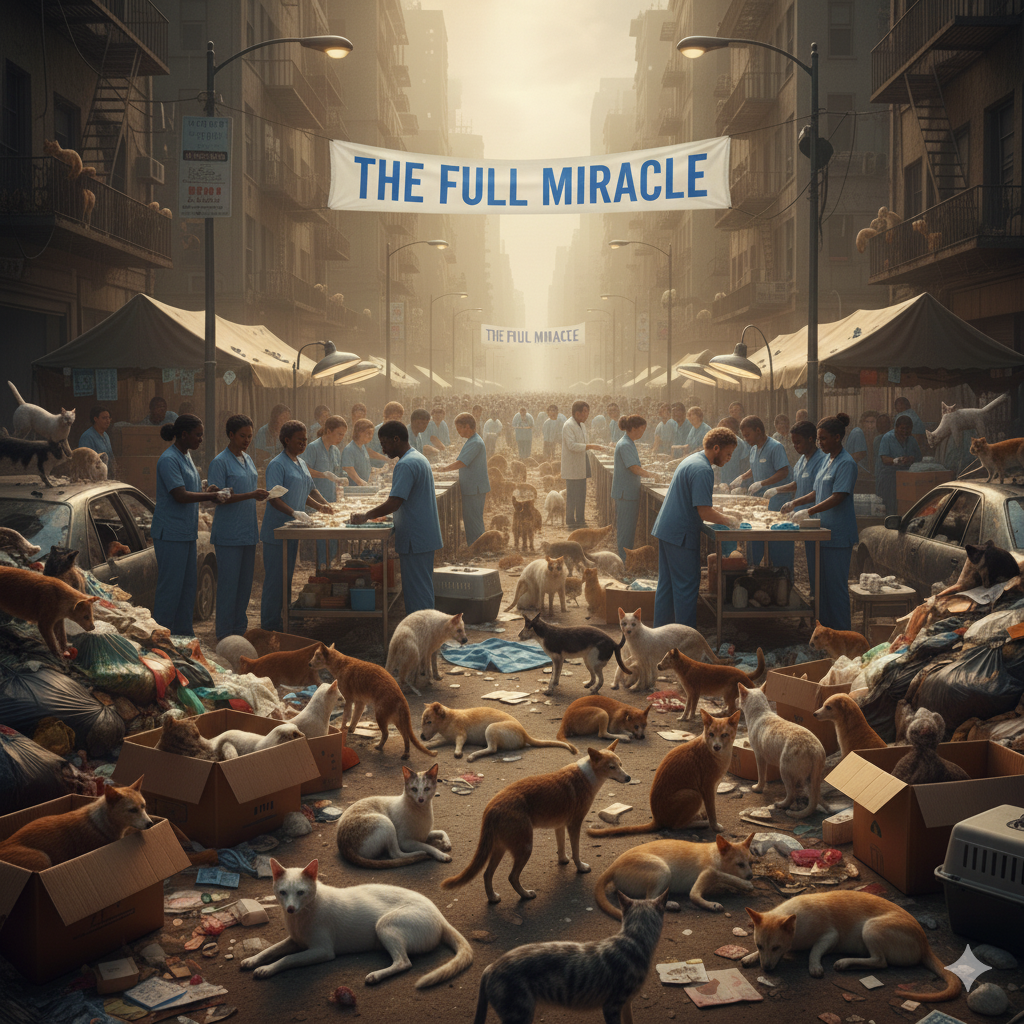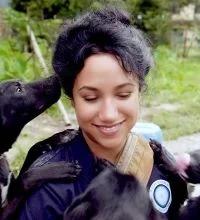Consider the Full Miracle
September7,2025Hours:21:14

In Nepal, I watched a mother dog die trying to protect puppies she couldn't feed. In the United States, I've seen healthy puppies and kittens euthanized because shelters ran out of space. Both tragedies have the exact root cause, and it's not what most people think.
a
Let's discuss the most common concerns I encounter regarding spaying and neutering, as understanding these perspectives helps us have more informed conversations about this critical issue.
a
"There are enough homes if people just tried harder to find them."
a
Let's start with the numbers, because they tell an important story. In the United States alone, approximately 607,000 animals were euthanized in shelters in 2024¹, despite declining euthanasia rates. Globally, tens of millions of animals are born each year, who struggle to find families willing to adopt them.
a
Cats are seasonally polyestrous, meaning they have multiple estrous cycles within a breeding season, followed by a period of non-cyclicity². In the Northern Hemisphere, cats typically cycle from spring through late fall when daylight hours are longer³. This natural reproductive pattern means that even with high kitten mortality rates in feral populations, unspayed cats and their offspring can produce exponentially more cats than available homes.
a
These aren't abstract numbers - each represents an individual animal who deserved a loving family. The reality is heartbreaking: healthy, loving animals are dying in shelters not because they're unwanted, but because there aren't enough people ready to adopt them.
a
"It's against nature."
a
Understanding these statistics helps us see why this argument, while well-intentioned, misses a crucial point. Dogs and cats didn't ask to be domesticated. We selectively bred wolves into Chihuahuas and transformed wild cats into Persians over thousands of years, creating animals who depend entirely on us for survival. As Antoine de Saint-Exupéry wrote in The Little Prince, "You become responsible, forever, for what you have tamed." In the wild, animal populations are regulated through predation, disease, and resource scarcity—mechanisms that involve immense suffering and death. But we removed our domestic animals from that harsh reality, which means we must replace those brutal natural controls with compassionate alternatives.
a
When we spay and neuter, we're not working against nature - we're fulfilling the responsibility that came with domestication.
a
"The surgery is risky and an unnatural medical intervention."
a
Here's where the science becomes encouraging. While any surgery carries some risk, spaying and neutering actually improve animals' lives dramatically. A University of Georgia study found that neutered male dogs lived 13.8% longer and spayed female dogs lived 26.3% longer. Spayed female cats lived 39% longer, and neutered male cats lived 62% longer⁴.
a
These aren't minor improvements - we're talking about years of additional life. Spaying prevents uterine infections and breast cancer, while neutering prevents testicular cancer and reduces prostate problems. Rather than being "unnatural intervention," these procedures protect animals from diseases that cause immense suffering.
a
"Spaying and neutering will change my animal's personality."
a
The truth about personality changes might surprise you. The effects of neutering are largely dependent on your individual animal's personality, physiology, and history⁵. The behaviors that decrease are primarily those driven by reproductive hormones - roaming, marking, and aggression toward other animals.
a
The qualities that make your animal special - their playfulness, affection, intelligence, unique quirks - those come from who they are, not from their reproductive status. We're not stealing their nature; we're giving them the freedom to be themselves without the biological compulsions that can put them in danger.
a
"I want my children to witness the miracle of birth."
a
I understand this sentiment, but I ask you to consider the full miracle: not just the birth, but the entire life that follows. Will all those puppies or kittens live long, happy lives? What about the emotional toll on the mother when her babies are taken away? What about the distress of young animals being separated from their mothers and everything familiar?
a
Given that millions of animals already need homes around the world, we can teach our children that the greatest miracle isn't creating new life - it's protecting and nurturing the life that already exists. We can volunteer at shelters, foster pregnant animals already in the system, or support rescue organizations.
a
"Animals have the right to reproduce - it's their natural instinct."
a
If we're genuinely concerned about the rights of animals, we should start with their most fundamental right: the right to live free from harm. Consider their right to keep their children instead of having them taken away and sold, or their right not to be forcefully bred by those who use them for profit or view their reproduction as entertainment.
a
Domestic animals aren't wild animals making conscious reproductive choices. Their reproductive instincts are often exploited for human profit, and many are forcefully bred in puppy mills and commercial breeding facilities purely for financial gain.
a
Meanwhile, unneutered animals are compelled by hormones to behaviors that endanger them - roaming in search of mates, getting into fights, risking traffic accidents. According to the American Veterinary Medical Association, neutering reduces breeding instincts, resulting in less roaming and fewer urine-marking behaviors⁶. House soiling is one of the most common behavioral problems in cats and dogs, and is a significant reason for companion animal relinquishment⁷.
a
When we spay and neuter, we're freeing animals from biological compulsions that lead to harm while helping them stay in their homes. True respect for animal rights means making medical decisions that prioritize their safety, health, and well-being.
a
The Reality We Must Face
a
Every time someone chooses to spay or neuter their animal companion, they're choosing compassion in action. They're recognizing that with millions of animals already waiting for homes, the most loving thing we can do is focus our care on the animals who are here now, rather than creating more who may face uncertain futures. It's a decision that prioritizes practical kindness over abstract ideals.
a
Our R.E.A.C.H. program (Rabies Elimination and Animal Community Health) includes sterilization because we've seen firsthand how spay and neuter programs transform communities. When we provide free sterilization services - particularly in places like Nepal, where street dog and cat populations are overwhelming - we don't just prevent future suffering, we strengthen bonds between humans and animals.
a
Imagine a world where every animal born is wanted, where every animal has a home, and where euthanasia truly is reserved only for animals who are suffering and cannot be saved. That world is possible, but only if we acknowledge our responsibility and take action.
a
To support our R.E.A.C.H program's sterilization initiatives and help us provide free spay/neuter services to communities in need, visit http://www.magicmarblefoundation.org/. Every contribution helps us prevent future suffering and create healthier communities for both animals and humans.
a
a
a
Sources:
a
- ASPCA. "U.S. Animal Shelter Statistics | Shelter Intake and Surrender." https://www.aspca.org/helping-people-pets/shelter-intake-and-surrender/pet-statistics
- Johnson, AK. "Normal feline reproduction: The queen." Journal of Feline Medicine and Surgery. 2022. https://journals.sagepub.com/doi/full/10.1177/1098612X221079706
- VCA Animal Hospitals. "Estrous Cycles in Cats." https://vcahospitals.com/know-your-pet/estrus-cycles-in-cats
- Humane World for Animals. "Why and when you should spay or neuter your pet." https://www.humaneworld.org/en/resources/why-and-when-you-should-spay-or-neuter-your-pet
- ASPCA. "Spay/Neuter Your Pet." https://www.aspca.org/pet-care/general-pet-care/spayneuter-your-pet
- American Veterinary Medical Association. "Spaying and neutering." https://www.avma.org/resources-tools/pet-owners/petcare/spaying-and-neutering
- American Association of Feline Practitioners/International Society of Feline Medicine. "Guidelines for Diagnosing and Solving House-Soiling Behavior in Cats." 2014. https://catvets.com/resource/aafp-isfm-house-soiling-guidelines/
The Author

Jennifer George
USA based tax-exempt charitable organization (tax-id number 86-1626792) under Section 501(c)(3) of the Internal Revenue Code. Donations are tax-deductible as allowed by law.
Register Address
455 E. Eisenhower Parkway #355 Ann Arbor, Michigan, 48108 USA
Created by Code2Steps
© 2024 Magic Marble Foundation. All rights Reserved

